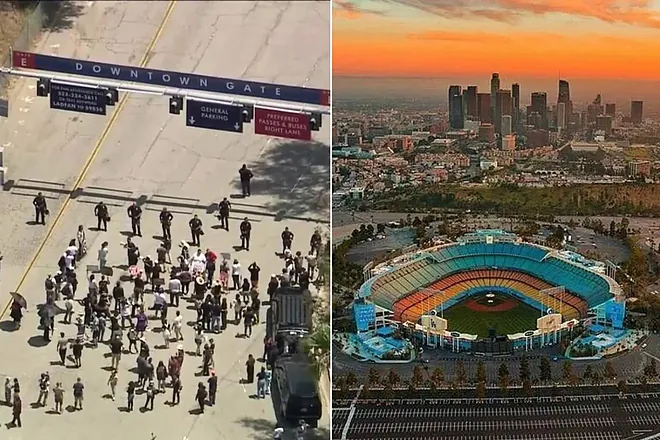In a dramatic turn of events that has quickly reverberated across political, legal, and sports landscapes, Los Angeles city officials have confirmed that federal Immigration and Customs Enforcement (ICE) agents were denied entry to Dodger Stadium in what has become a powerful flashpoint in the national debate over immigration enforcement and sanctuary policies. The attempted incursion occurred during a routine Major League Baseball game between the Los Angeles Dodgers and an out-of-state rival, but the true drama took place not on the field, but just outside its gates.
According to multiple city sources, ICE agents arrived at the stadium with the intention of locating and apprehending an individual suspected of being undocumented and present at the venue. The agents, who arrived without a criminal warrant, requested entry to execute what they claimed was a lawful investigation. However, Los Angeles city officials, working in concert with stadium security and following city protocols on sanctuary city compliance, refused to grant the agents access. The decision immediately drew praise from immigrant rights groups and civil liberties advocates, while igniting sharp criticism from federal officials and law-and-order proponents.
Los Angeles, long known for its progressive policies and robust immigrant population, has operated under sanctuary city guidelines for several years. These guidelines restrict local cooperation with federal immigration enforcement in many circumstances, particularly when such actions would violate constitutional protections or foster distrust in immigrant communities. The city’s leadership, including Mayor Karen Bass and City Attorney Hydee Feldstein Soto, have remained resolute in their defense of policies that prioritize public safety over what they consider to be unnecessary and invasive immigration raids.
The situation at Dodger Stadium is emblematic of the tensions between federal immigration authorities and local jurisdictions that have opted to shield undocumented residents from aggressive federal enforcement tactics. ICE officials, for their part, have argued that their actions are legal and necessary to uphold immigration law, often pointing to cases involving individuals with prior deportation orders, criminal convictions, or pending court proceedings. However, the lack of a judicial warrant in this case proved pivotal.
Under federal law, ICE agents do not require a judicial warrant to detain undocumented immigrants, but local jurisdictions are not obligated to assist them without such documentation. In this case, city officials stood firm, citing the absence of a court-issued warrant as the basis for their denial. That distinction—between administrative and judicial warrants—has become a central battleground in sanctuary cities across the country.
Witnesses at the stadium noted that the agents appeared surprised by the resistance. The agents reportedly made their case to stadium security before being escalated to city representatives stationed nearby. The city’s legal counsel on-site reiterated that, without a judicial warrant, there would be no access granted to any private or restricted areas within the stadium. As tensions mounted, the agents eventually left the premises without incident.
The attempted raid did not go unnoticed. News of the confrontation quickly spread on social media, with attendees sharing live updates and videos showing a visibly tense interaction between security officials and federal agents. Advocates for immigrant rights used the moment to highlight the necessity of strong local policies that protect immigrant communities from what they describe as fear-inducing tactics.
Mayor Bass later issued a statement, saying, “The City of Los Angeles remains committed to upholding the dignity, privacy, and safety of every person in our community. Dodger Stadium is not a place for federal immigration enforcement. It is a place where families gather, where communities come together, and where our values as Angelenos are on full display.”
Civil liberties organizations like the ACLU of Southern California applauded the city’s actions, issuing statements that framed the denial of ICE access as not only lawful but essential in preserving constitutional protections. “This is exactly why sanctuary policies exist,” said Hector Villanueva, an attorney for the group. “It is not about ignoring the law—it’s about applying it properly, with due process, oversight, and respect for human rights.”
Meanwhile, ICE spokespersons expressed frustration, releasing a public statement indicating that the agency was “disappointed by the lack of cooperation from local authorities, which undermines public safety and emboldens those who believe they can defy federal law with impunity.” The statement went on to say that the agency would continue to pursue lawful enforcement actions wherever necessary and that obstruction of those duties could have consequences.
The person ICE agents were reportedly seeking has not been publicly identified, and city officials have refused to confirm whether the individual was indeed present at the stadium. Privacy laws prohibit disclosing immigration status or location of individuals unless a legal process requires it. Still, speculation continues to swirl, and immigrant rights groups have expressed concern about the possibility of surveillance and targeting at public events.
The incident has triggered a broader conversation about the role of sports venues in community protection. Dodger Stadium, one of the most iconic and diverse gathering places in the country, represents more than just a ballpark—it’s a cultural hub. For many in the immigrant community, attending a game is one of the few spaces where they can experience normalcy without fear. The prospect of federal agents conducting enforcement actions in such spaces threatens to undermine that sense of safety.



